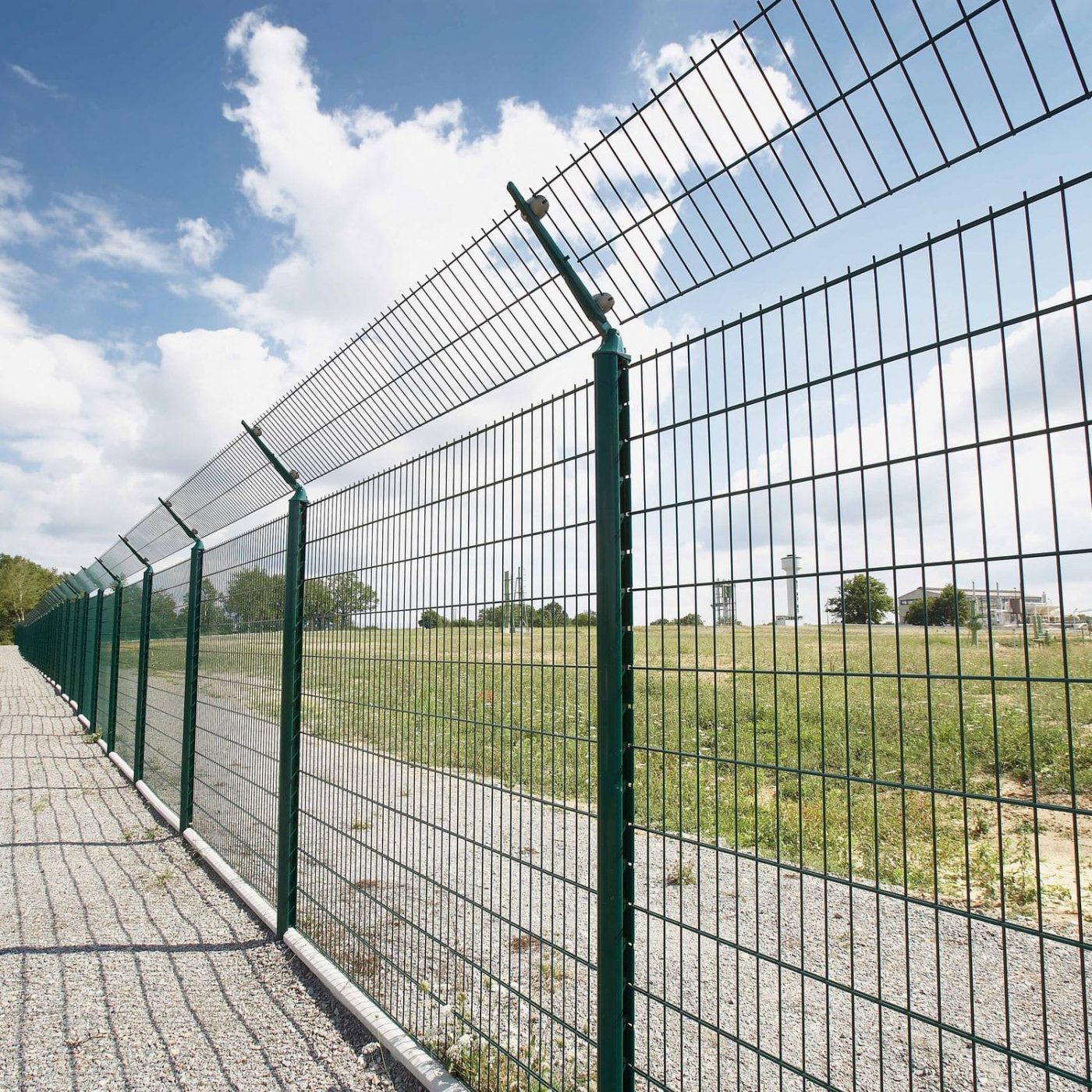Looking to expand your knowledge on fences? Well, look no further because you’ve stumbled upon the perfect blog! “Fencedude.com” is dedicated to providing you with comprehensive and engaging content about fences. From different types and materials to sizes and shapes, this blog covers it all. Whether you’re interested in enhancing privacy, ensuring security, or adding decorative elements to your property, we’ve got you covered. Our aim is to educate you about the characteristics and advantages of various fence types, while also offering guidance on choosing the appropriate size and shape based on your specific needs. We want to be your go-to resource for all things fence-related, so why wait? Start exploring our posts today!
Introduction to Industrial Property Fences
Industrial properties require robust and reliable security measures to protect valuable assets and ensure the safety of employees. One of the most effective ways to enhance security is by installing appropriate fences around industrial properties. Industrial property fences not only serve as physical barriers but also act as deterrents against potential intruders. In this article, we will delve into the importance of security for industrial properties and explore the factors to consider when choosing the right fence. We will also discuss various types of fences suitable for industrial properties, their benefits, and relevant considerations. So let’s dive in and learn more about industrial property fences.
Importance of Security for Industrial Properties
Security is paramount for industrial properties, as they often house expensive machinery, sensitive information, and valuable inventory. By implementing robust security measures, industrial property owners can deter criminals, prevent unauthorized access, and minimize the risk of theft, vandalism, and other security breaches.
A well-designed and properly installed fence can significantly enhance the security of an industrial property. It acts as a physical barrier, making it difficult for unauthorized individuals to enter the premises. This provides a sense of safety and peace of mind to business owners and employees, allowing them to focus on their operations without constantly worrying about security threats.
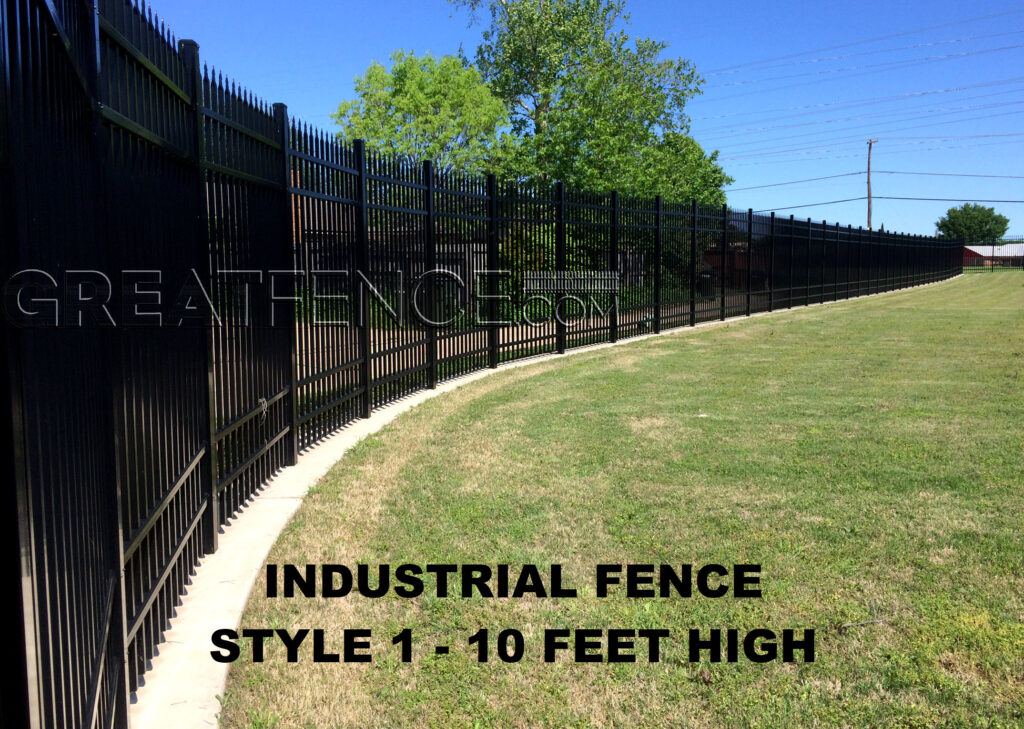
Factors to Consider for Industrial Property Fences
When choosing a fence for an industrial property, there are several factors that need to be considered to ensure optimal security and functionality. Let’s explore these factors in more detail:
3.1 Property Size and Layout
The size and layout of the industrial property play a crucial role in determining the type and size of the fence required. Larger properties might need taller fences to provide an adequate level of security, while smaller properties may only need a lower fence. It is important to consider the overall perimeter length as well as any specific areas that require additional security, such as entrances, parking lots, or storage yards.
3.2 Level of Security Required
The level of security required is another key consideration when choosing an industrial property fence. Different businesses have different security needs, and it is essential to assess the potential risks and vulnerabilities of the property. For instance, highly secured facilities might require fences with additional security features like anti-climb panels or electric fencing, while less secure properties may opt for standard chain-link fences.
3.3 Durability and Maintenance
Industrial property fences are exposed to various environmental factors and potential wear and tear. It is crucial to select a fence material that is durable and requires minimal maintenance. This will ensure that the fence remains in good condition for an extended period, reducing the need for frequent repairs or replacements. Additionally, considering the maintenance requirements and associated costs can help determine the long-term viability and affordability of different fence options.
3.4 Aesthetic Considerations
While security is the primary purpose of an industrial property fence, aesthetic considerations should not be overlooked. The fence should complement the overall appearance of the property and potentially improve its curb appeal. Depending on the location and nature of the business, certain aesthetic features like color options, patterns, or decorative elements may be desirable. Striking the right balance between security and aesthetics can create a visually appealing and secure environment.
Types of Fences Suitable for Industrial Properties
Now that we understand the factors to consider when choosing an industrial property fence let’s explore some of the commonly used fence types that are suitable for industrial properties. Each type of fence has its own unique features, advantages, and considerations. Here are a few worth considering:
4.1 Chain-Link Fences
Chain-link fences are one of the most common and cost-effective options for industrial properties. They consist of a woven mesh of galvanized or coated steel wires. Chain-link fences provide effective boundary demarcation and are known for their versatility, durability, and low maintenance requirements. They are available in various heights and can be customized to add additional security features like barbed wire or privacy slats.
4.2 Welded Wire Mesh Fences
Welded wire mesh fences are similar to chain-link fences but have a more rigid structure. They are constructed by welding steel wire intersections, creating a sturdy and secure mesh pattern. Welded wire mesh fences offer excellent visibility, allowing for easy monitoring of the property. They are highly durable, require minimal maintenance, and offer good resistance against climbing or tampering.
4.3 Anti-Climb Fences
Anti-climb fences are designed specifically to prevent unauthorized individuals from climbing over the fence. They typically feature narrow vertical bars or closely spaced mesh patterns to make it extremely difficult to gain a foothold. Anti-climb fences provide enhanced security, particularly in high-risk areas. They can be further fortified with features like barbed wire or rotating spikes to deter potential intruders.
4.4 Palisade Fences
Palisade fences are known for their high-level security features. They consist of vertical steel bars or pales with pointed or rounded tops, providing a strong physical barrier. Palisade fences are difficult to climb and offer excellent visibility, making them a popular choice for industrial properties. They come in various heights and can be customized with added security features like a spiked top for enhanced deterrence.
4.5 Electric Fences
Electric fences utilize an electrified wire to deter potential intruders. When someone touches or attempts to breach the fence, they receive a mild electric shock, discouraging further attempts to trespass. Electric fences are particularly suitable for high-security areas where an additional deterrent is needed. It is important to comply with local regulations and safety guidelines when installing electric fences to ensure proper usage and prevent accidents.
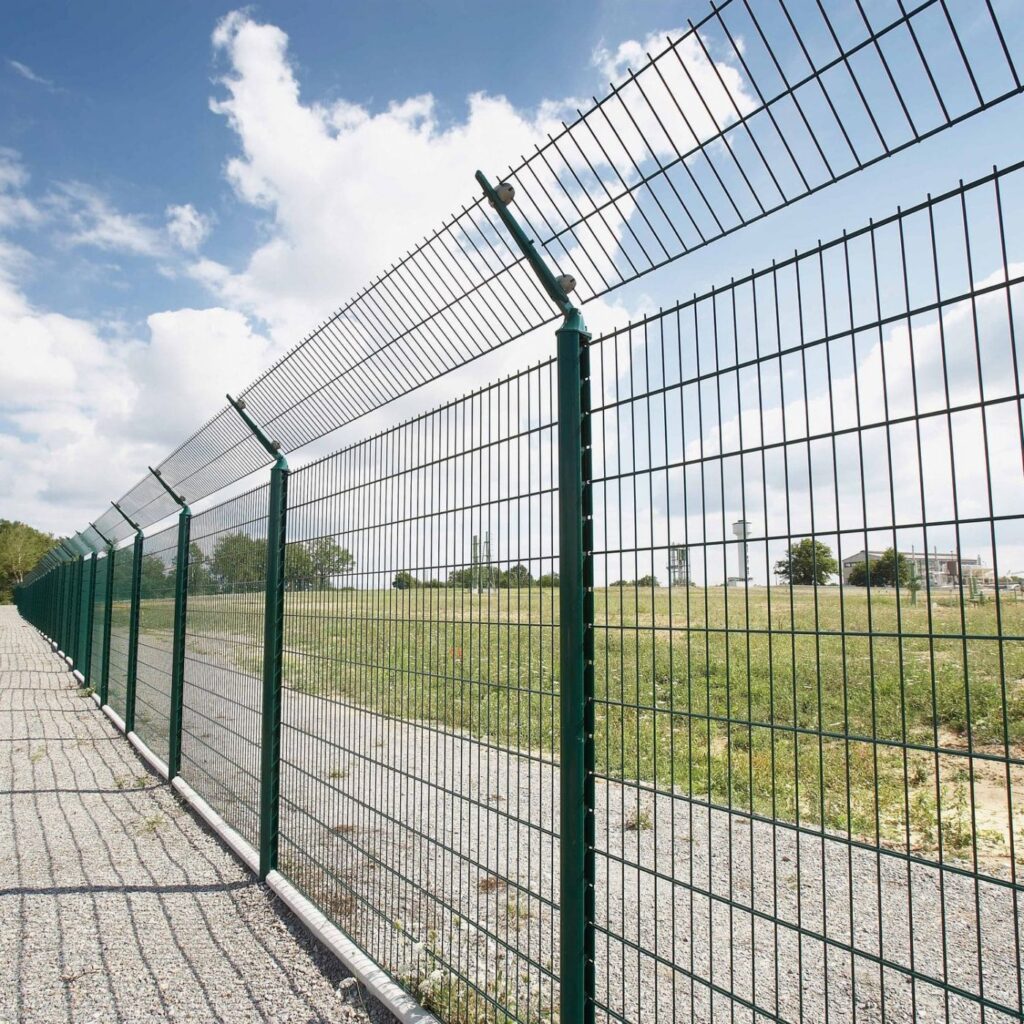
Benefits and Considerations of Chain-Link Fences
Chain-link fences have long been a popular choice for industrial properties due to their numerous benefits. Let’s take a closer look at some of the advantages and considerations of using chain-link fences:
5.1 Security Features
Chain-link fences provide a secure barrier for industrial properties, obstructing unauthorized access and deterring potential intruders. The woven mesh design allows for visibility, making it easier to monitor the property and identify any suspicious activities. Additionally, chain-link fences can be further reinforced with features such as barbed wire or privacy slats to enhance security.
5.2 Durability and Maintenance
Chain-link fences are highly durable and can withstand various weather conditions, making them suitable for long-term use. They are resistant to rust, corrosion, and pests, minimizing the need for frequent maintenance. Chain-link fences require minimal upkeep, typically limited to occasional cleaning or repairs to damaged sections.
5.3 Cost-Effectiveness
One of the key advantages of chain-link fences is their affordability. They are generally more cost-effective compared to other types of fences, making them an attractive option for industrial property owners on a budget. The installation process is relatively quick and straightforward, further contributing to their overall cost-effectiveness.
5.4 Versatility
Chain-link fences offer versatility in terms of customization and adaptability to various property requirements. They come in different heights and can be easily adjusted or modified to suit specific needs. Chain-link fences can be installed in different configurations, including single or double gates, providing convenient access points for authorized personnel or vehicles.
Now that we have discussed the benefits and considerations of chain-link fences, let’s move on to another type of industrial property fence.
Advantages and Considerations of Welded Wire Mesh Fences
Welded wire mesh fences are an excellent alternative to traditional chain-link fences, offering their own set of advantages and considerations. Let’s explore them in more detail:
6.1 Strength and Durability
Welded wire mesh fences are renowned for their strength and durability. The welded intersections create a rigid and robust structure, ensuring that the fence remains intact even under significant pressure or impact. This makes them an ideal choice for industrial properties that require a higher level of security and protection.
6.2 Visibility and Aesthetic Appeal
One of the distinguishing features of welded wire mesh fences is their excellent visibility. The open mesh pattern facilitates clear visibility through the fence, allowing for easy monitoring of the property. Additionally, the clean and sleek design of welded wire mesh fences can add a modern and polished look to the industrial property, enhancing its overall aesthetic appeal.
6.3 Ease of Installation and Maintenance
Welded wire mesh fences are relatively easy to install, requiring minimal equipment and expertise. The fence panels are typically pre-fabricated, making the installation process quicker and more straightforward. In terms of maintenance, welded wire mesh fences require minimal upkeep. Regular inspections and occasional cleaning are usually sufficient to keep the fence in good condition.
Now that we have explored the advantages and considerations of welded wire mesh fences, let’s delve into another type of industrial property fence that provides enhanced security features.
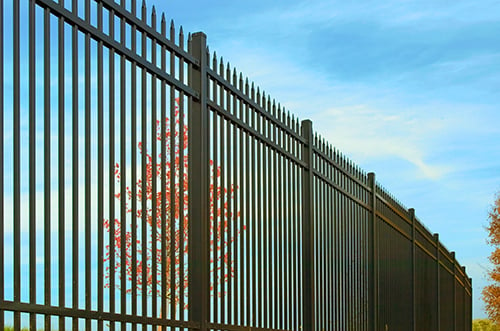
Exploring Anti-Climb Fences for Industrial Properties
When it comes to maximizing security, anti-climb fences are an excellent option for industrial properties. Let’s take a closer look at the advantages and considerations of installing anti-climb fences:
7.1 Enhanced Security
Anti-climb fences are specifically designed to deter potential intruders from climbing over the fence. The narrow vertical bars or closely spaced mesh patterns make it extremely difficult for unauthorized individuals to gain a foothold or find handholds. This makes anti-climb fences an effective security measure, preventing unauthorized access and enhancing the overall security of the industrial property.
7.2 Deterrence and Prevention
The primary purpose of anti-climb fences is to discourage potential intruders from attempting to breach the perimeter. The visible obstacle presented by the fence acts as a deterrent, signaling that unauthorized access is challenging and carries a high risk of detection. Anti-climb fences provide an extra layer of protection, helping to prevent unauthorized entry and minimize security breaches.
7.3 Intruder Visibility
Another advantage of anti-climb fences is the visibility they offer. The narrow vertical bars or closely spaced mesh patterns allow for clear visibility through the fence, enabling easy monitoring of the property. This enhances the ability to detect any suspicious activities or potential security threats, ensuring a prompt response and preventing any adverse incidents.
Now that we have covered the benefits and considerations of anti-climb fences, let’s explore another type of industrial property fence that offers high-level security features.
Palisade Fences: An Effective Security Solution
Palisade fences are renowned for their high-level security features, making them a popular choice for industrial properties. Let’s take a closer look at the advantages and considerations of installing palisade fences:
8.1 High-Level Security Features
Palisade fences provide a significant level of security due to their unique design and construction. The vertical steel bars or pales with pointed or rounded tops act as a strong physical barrier, making it extremely difficult for intruders to breach the fence. Additionally, the height and strength of palisade fences make them highly effective in deterring and preventing unauthorized access.
8.2 Deterrence and Intruder Detection
The imposing appearance of palisade fences serves as a powerful deterrent to potential intruders. The pointed or rounded tops, combined with the robust construction, send a clear message that unauthorized access is not easily achievable. Furthermore, the open design of palisade fences allows for easy visibility, enabling rapid detection of any suspicious activities or security breaches.
8.3 Aesthetic Options
Palisade fences offer various aesthetic options to suit different architectural styles and preferences. They are available in different heights and can be customized with features like different pales, finishes, or decorative elements. This allows industrial property owners to select a palisade fence that not only provides high-level security but also complements the overall appearance of the property.
Now that we have discussed the advantages and considerations of palisade fences, let’s move on to another type of industrial property fence that utilizes advanced technology for enhanced security.
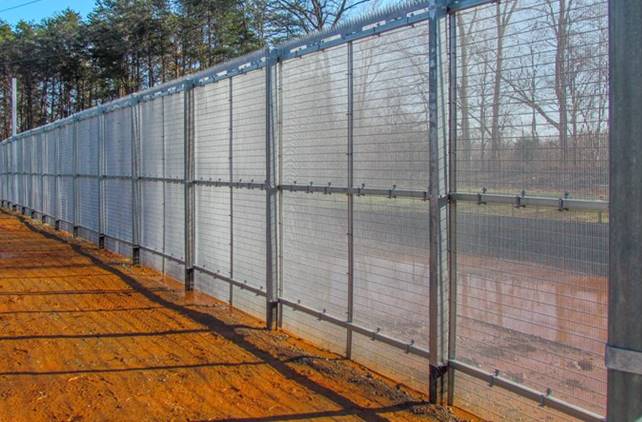
Electric Fences: Enhancing Security for Industrial Properties
Electric fences are an advanced security solution that can significantly enhance the protection of industrial properties. Let’s explore how electric fences work and the benefits and considerations of installing them:
9.1 How Electric Fences Work
Electric fences utilize an electrified wire or a series of wires to provide an additional deterrent against potential intruders. When someone comes into contact with the electrified wires or attempts to breach the fence, they receive a mild electric shock. This shock serves as a powerful deterrent, discouraging further attempts to trespass and ensuring the security of the industrial property.
9.2 Benefits of Electric Fences
Electric fences offer several notable benefits for industrial properties. Firstly, they provide an effective physical barrier, making it difficult for unauthorized individuals to access the property. Secondly, the electrified wires act as a formidable deterrent, deterring potential intruders from attempting to breach the fence. Additionally, the visibility of the electric fence can further discourage trespassers and facilitate easy monitoring of the property.
9.3 Legal Considerations and Safety Measures
When considering the installation of an electric fence, it is essential to comply with local regulations and safety guidelines. Industrial property owners need to ensure that the electric fence installation meets the necessary standards and does not pose any safety risks to employees, authorized personnel, or potential intruders. Regular inspections and maintenance are crucial to keeping the electric fence functioning properly and within legal parameters.
Now that we have explored the benefits and considerations of electric fences, let’s move on to discussing the different materials used in constructing industrial property fences.
Materials for Industrial Property Fences
The choice of material for an industrial property fence is an important consideration as it impacts factors such as durability, security, and overall aesthetic appeal. Let’s take a closer look at some of the common materials used in constructing industrial property fences:
10.1 Steel
Steel is a widely used material for industrial property fences due to its strength, durability, and ability to withstand harsh conditions. Steel fences offer excellent security and can be customized with additional features like anti-climb panels or spikes. However, steel fences may require regular maintenance to prevent rusting and corrosion.
10.2 Aluminum
Aluminum fences are known for their lightweight nature and resistance to rust and corrosion. They offer a good balance between strength and durability while requiring minimal maintenance. Aluminum fences are available in various styles and can be powder-coated to enhance their aesthetic appeal.
10.3 Vinyl
Vinyl fences are becoming increasingly popular for industrial properties due to their durability, low maintenance requirements, and aesthetic versatility. Vinyl fences are resistant to fading, cracking, and warping, making them suitable for long-term use. They are available in various colors, textures, and styles, allowing industrial property owners to select a fence that matches their specific requirements.
10.4 Wood
Wooden fences can add a natural and traditional aesthetic to industrial properties. Wood fences offer privacy and can be customized to various heights and styles. However, wood requires regular maintenance, including staining or painting and occasional repairs to address issues like rot or insect damage.
Now that we have explored the different materials used in industrial property fences, let’s move on to discussing the importance of choosing the right fence size and shape.
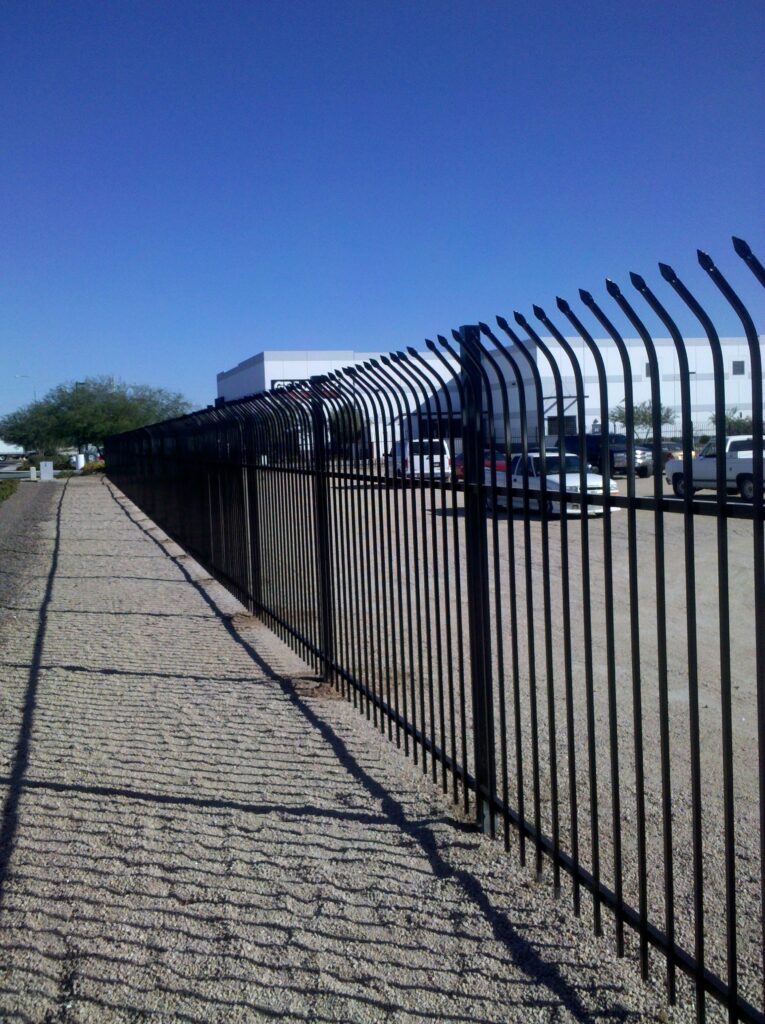
Choosing the Right Fence Size and Shape for Industrial Properties
Selecting the appropriate size and shape of an industrial property fence is crucial for ensuring security, functionality, and aesthetics. Let’s delve into the factors to consider when determining the right fence size and shape for your specific needs:
11.1 Determining Proper Height and Width
The height and width of the industrial property fence depend on several factors, including security requirements, property size, local regulations, and the nature of the business. Taller fences provide increased security but can potentially create a more imposing appearance. The width of the fence should be determined based on the desired level of enclosure and the specific areas that need to be secured.
11.2 Considerations for Enclosure Purposes
Industrial properties may require different levels of enclosure for various areas or sections. For instance, parking lots or storage yards may need higher fences to prevent unauthorized access, while administrative areas may require lower fences to maintain a more open and welcoming appearance. It is essential to assess the specific needs of the property and determine the appropriate level of enclosure for each area.
11.3 Architectural Integration
The fence should be integrated with the architectural design and style of the industrial property. This involves considering factors such as the use of compatible materials, choosing fence features that complement the existing aesthetics, and ensuring that the fence does not detract from the overall appearance of the property. Taking these architectural considerations into account helps create a cohesive and visually appealing environment.
Now that we have discussed the importance of choosing the right fence size and shape, let’s move on to understanding the maintenance and repair requirements of industrial property fences.
Maintenance and Repair of Industrial Property Fences
Regular maintenance and prompt repairs are essential for ensuring the longevity and optimal functionality of industrial property fences. Let’s explore some of the key aspects of maintaining and repairing industrial property fences:
12.1 Regular Inspections
Regular inspections are vital for identifying any potential issues or damage to the fence. Inspections should be conducted at least once or twice a year, depending on the fence material and environmental conditions. During inspections, look for signs of corrosion, loose or damaged components, and any areas that require cleaning or repainting. Promptly addressing any issues found during inspections can help prevent further damage and ensure the fence remains in good condition.
12.2 Cleaning and Painting
Cleaning the fence periodically helps maintain its appearance and remove any debris or dirt that may accumulate over time. The appropriate cleaning method and frequency depend on the fence material, and it is essential to follow the manufacturer’s guidelines for best results. Additionally, applying a fresh coat of paint or protective coating can help prolong the lifespan of the fence and provide an extra layer of protection against weather elements.
12.3 Repairing Damaged Sections
Inevitably, industrial property fences may sustain damage over time due to various factors like weather conditions, accidents, or intentional vandalism. It is crucial to address any damaged sections promptly to prevent further deterioration and potential security breaches. Repairs may involve replacing broken components, fixing loose connections, or reinforcing weak areas. Engaging professional fence repair services can ensure proper repairs are carried out efficiently and effectively.
Now that we have covered the maintenance and repair aspects of industrial property fences let’s move on to addressing common questions and providing relevant answers to further educate readers.
Common Questions and Answers about Industrial Property Fences
-
Q: What is the average lifespan of an industrial property fence?
A: The lifespan of an industrial property fence can vary based on various factors such as the chosen material, installation quality, maintenance, and environmental conditions. Generally, well-maintained fences can last anywhere from 20 to 50 years, with some materials like steel or vinyl offering longer durability.
-
Q: Can industrial property fences be customized to match specific requirements?
A: Yes, industrial property fences can be customized to meet specific requirements. This includes selecting the appropriate height, width, material, and additional security features to suit the unique needs of the property.
-
Q: Are permits required for installing industrial property fences?
A: Permit requirements for installing fences vary depending on local regulations and the specific location of the industrial property. It is advisable to check with local authorities or consult a professional fence installer to determine the necessary permits and legal requirements.
-
Q: Do industrial property fences require regular maintenance?
A: Yes, regular maintenance is crucial to ensure the optimal performance and lifespan of industrial property fences. This may involve periodic cleaning, inspections, and addressing any repairs or maintenance needs.
-
Q: Can industrial property fences improve privacy?
A: Yes, certain fence types like solid panels or vinyl fences can enhance privacy by obstructing the view from outside. However, it is important to consider local regulations and any potential impact on neighboring properties when installing privacy-enhancing fences.
-
Q: Can industrial property fences be installed on uneven terrain?
A: Yes, industrial property fences can be installed on uneven terrain. Professional fence installers have the expertise and equipment to adapt the fence installation to the specific landscape, ensuring proper alignment and security.
-
Q: Can industrial property fences be equipped with security systems?
A: Yes, industrial property fences can be integrated with various security systems such as CCTV cameras, access control gates, or intrusion detection systems. These additional security features further enhance the overall security of the industrial property.
-
Q: How can the aesthetic appeal of industrial property fences be improved?
A: The aesthetic appeal of industrial property fences can be enhanced through various means, such as choosing the appropriate material, color, or decorative elements. Working with a professional fence installer or considering architectural integration can help ensure a visually appealing and cohesive appearance.
-
Q: Can industrial property fences withstand extreme weather conditions?
A: Many industrial property fences are designed to withstand various weather conditions. However, the specific durability and resistance depend on the chosen material and maintenance practices. Consulting with a professional fence installer can help select a fence that can withstand the prevalent weather conditions of the area.
-
Q: Are industrial property fences difficult to install?
A: The difficulty level of installing an industrial property fence can vary based on factors such as the chosen fence type, size, and location. While some fences may require specialized equipment or expertise, others can be installed using basic tools and techniques. It is recommended to consult with professional fence installers to ensure proper installation and adherence to any local regulations or guidelines.
Now that we have addressed some common questions about industrial property fences let’s conclude the article.
Conclusion
Industrial property fences are a crucial security measure for protecting valuable assets, ensuring the safety of employees, and preventing unauthorized access. When selecting an industrial property fence, it is important to consider factors such as property size and layout, desired level of security, durability, and aesthetic appeal. Chain-link fences, welded wire mesh fences, anti-climb fences, palisade fences, and electric fences are some of the suitable options for industrial properties, each offering unique features and advantages. The choice of fence materials, size, shape, and appropriate maintenance are additional considerations that can contribute to the overall effectiveness and longevity of the industrial property fence. By understanding these factors and making informed decisions, industrial property owners can create a secure and visually appealing environment that meets their specific needs and requirements.
